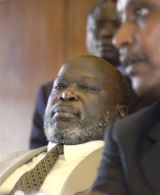Concept of identity will determine the future of Sudan peace deal
By Nora Boustany, The Washington Post
Feb 11, 2005 — The year was 1974, and a young Sudanese army officer from the southern part of the country and his superior, a major from the north, had come to the United States with hundreds of other people from around the world for military training at Fort Benning, Ga. .

|
|
John Garang during a press conference last year in Cairo (AP). |
The group spent a week of orientation in Washington to study U.S. history, the Constitution and government. During one session, the Africans in the group were asked to stand up and be counted, but the two Sudanese remained seated. When the Middle Eastern members were called on, they still stayed put.
“At the end, we were the only two left,” recalled John Garang, the southerner, who later led a decades-long rebellion against the Sudanese government. “We were obviously African . . . but this is the issue of identity. We don’t know who we are, and that underlies the ambiguity.”
Since 1956, when Sudan was freed from foreign mandate powers, the country has “failed to find itself and to have a soul,” Garang said in an interview in Washington this week. “Various governments have come and gone, and the Sudanese have looked for their identity elsewhere — in Christianity, in the Arab world, in scenarios of an Islamic state. But we did not ask ourselves: What made us Sudanese?”
This concept of identity, a key factor in conflicts across Sudan, will determine the success or failure of a peace accord between Garang’s group, the rebel Sudanese People’s Liberation Army, based in the mostly animist and Christian south, and the Islamic government based in the capital, Khartoum.
The agreement, signed last month, ended more than 20 years of fighting. It stipulates, among other important points, that the south will have a six-year interim period of self-rule, after which it will vote in a referendum on whether to remain part of Sudan or secede. And it made Garang, who turns 60 this year, Sudan’s vice president.
“I am not going to fight, but I want to step back so we can go forward,” Garang said Wednesday, a day after meeting with the U.N. Security Council in New York to emphasize the need for postwar funding. “I am only gathering momentum to rediscover ourselves, to evolve the Sudanese identity that incorporates all of us irrespective of tribe, religion or race.”
Born in a village in the Bor district of the Upper Nile, Garang grew up playing with goats and sheep as his father herded the cows. When he was 8 years old, a relative prevailed on the family to allow Garang to go to school in Bahr al-Ghazal, across the river, where he worked as a cook for a British colonial officer and headmaster of six schools.
Soon after Garang left for school, his father died, followed the next year by his mother. “I have been alone since I was 9,” he said.
Fighting between the government and the rebels began in the 1950s. Garang joined a guerrilla movement in 1962, but because he was so young, the leaders encouraged him and others his age to seek an education. Garang went to Tanzania, then called Tanganyika, and attended high school.
In 1965, he applied to attend college in the United States and received a scholarship to Grinnell College in Iowa. He earned a bachelor’s degree in economics in 1969. He returned to Tanzania to do research. He eventually went back to Iowa, he said, and received a doctorate in agricultural economics from Iowa State University in the 1980s.
A compromise in 1972 ended the fighting, and Garang was absorbed into the Sudanese army. But the war resumed in 1983, when the government abrogated the agreement and imposed sharia, or Islamic law, on the country.
Garang, who rejoined the rebels, became their leader. He has variously been regarded as a freedom fighter and as a terrorist. At one point, he allied himself with the Libyan leader, Moammar Gaddafi, but broke with him after the SPLA was targeted by government planes provided by Libya.
The agreement reached between the SPLA and the government does not cover unrelated violence in Sudan’s western region of Darfur, where, according to human rights and aid groups, a government-backed Arab militia, called the Janjaweed, has terrorized African villagers. Tens of thousands have died in the crisis, and nearly 2 million people have been driven from their farms and into crowded camps.
Garang has offered to intercede in the Darfur. “We will work for peace for Darfur,” he said last month at a rally in southern Sudan. “We cannot have peace in one part of the country and war in another.” He said he met with representatives of the armed opposition groups and the Khartoum authorities before traveling to the United States this week.
Garang is pleading for aid for southern Sudan, which was badly battered in the war.
“Now we have a possibility to fundamentally change Sudan, of putting our country back together again and achieving our vision for the new Sudan. It is payback time for the SPLA, to the people who have suffered, to deliver, to build schools and hospitals, to have the new Sudan we have fought for,” he said. “That’s how nations are built. They are born out of struggle.”
